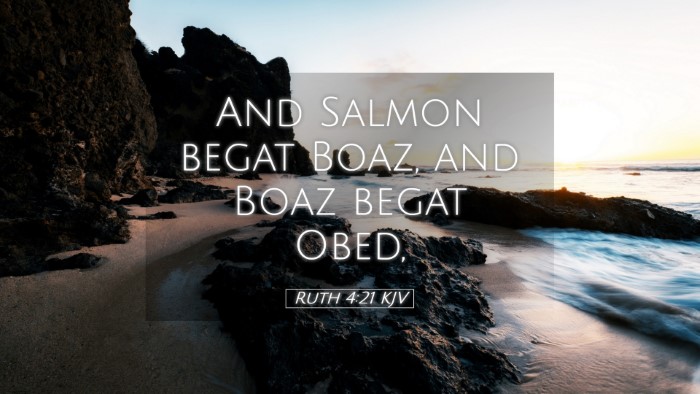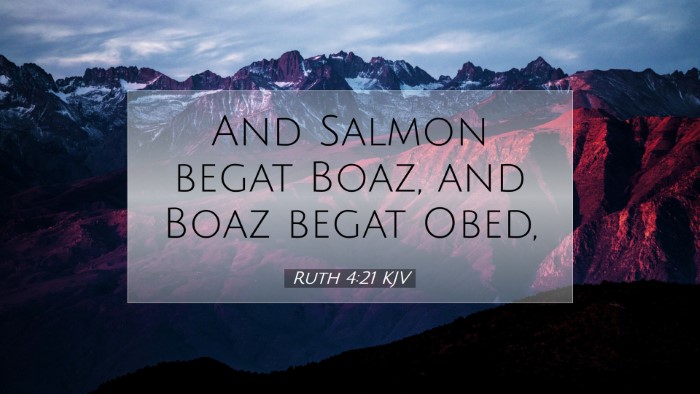Old Testament
Genesis Exodus Leviticus Numbers Deuteronomy Joshua Judges Ruth 1 Samuel 2 Samuel 1 Kings 2 Kings 1 Chronicles 2 Chronicles Ezra Nehemiah Esther Job Psalms Proverbs Ecclesiastes Song of Solomon Isaiah Jeremiah Lamentations Ezekiel Daniel Hosea Joel Amos Obadiah Jonah Micah Nahum Habakkuk Zephaniah Haggai Zechariah MalachiRuth 4:21
Ruth 4:21 KJV
And Salmon begat Boaz, and Boaz begat Obed,
Ruth 4:21 Bible Commentary
Bible Commentary on Ruth 4:21
Verse Reference: Ruth 4:21
"And Salmon begat Boaz, and Boaz begat Obed."
Introduction
The genealogy presented in Ruth 4:21 serves not only as a genealogical record but also as a profound theological statement regarding God’s providence and plan of redemption. This verse culminates the narrative of Ruth, highlighting key figures in the lineage leading to King David and ultimately to Christ. By examining public domain commentaries, we can gain valuable insights into its historical, theological, and practical implications.
Context and Significance
Understanding Ruth 4:21 is rooted in its context within the Book of Ruth, which tells the story of loyalty, redemption, and divine provision.
- Historical Setting: The events transpire during the time of the judges—a period marked by social turmoil, yet God’s grace shines through individual stories of faith, particularly in the lives of Ruth and Boaz.
- Theological Themes: The themes of redemption, lineage, and divine favor permeate this passage. The mention of "Salmon" and the following generational line connects Ruth’s story to the larger narrative of Israel’s ancestry.
Insights from Commentaries
Matthew Henry
Matthew Henry observes that the genealogy in Ruth 4:21 emphasizes the importance of family heritage in biblical times. He notes:
"It is not only a record of biological descent but a testament to God’s providential care in preserving a righteous lineage through whom salvation would come."
Henry underscores the significance of Boaz in this line, reflecting on his role as a redeemer—symbolic of Christ’s redemptive work. He comments on the use of "begat," which highlights continuity and the importance of generational faithfulness.
Albert Barnes
Albert Barnes provides a detailed examination of the names listed in Ruth 4:21, emphasizing their significance:
- Salmon: Identified as an ancestor of David, hinting at his significance in the royal lineage.
- Boaz: Recognized as a kinsman-redeemer, symbolizing Christ’s redemptive work where He restores relationships and fulfills promises.
- Obed: Marked as a servant of the Lord, indicating the humble beginnings of this lineage leading to significant figures in biblical history.
Barnes also points out that genealogies in Scripture represent God's faithful promise and plan being fulfilled through generations, leading to the fulfillment of the messianic promise.
Adam Clarke
Adam Clarke elaborates on the genealogy’s structural and literary features. He emphasizes:
"The linkage of generations reflects a divine order in human affairs, allowing believers to see how God sovereignly orchestrates history."
Clarke suggests that the genealogy serves as a bridge connecting Ruth—the Moabite widow, to the greater plan of salvation and redemption through David and, ultimately, Jesus Christ. He remarks on how these historical figures demonstrate God's inclusion of the Gentiles into His plan.
Theological Reflections
The genealogical note of Ruth 4:21 provokes rich theological reflections, particularly concerning God’s redemptive history.
- Divine Sovereignty: The careful recording of family ties demonstrates God’s hand in establishing a lineage through which the Messiah would come—not through human effort but by divine selection.
- Inclusion of the Gentiles: The presence of Ruth, a Gentile, in the lineage points to the universal scope of God’s plan of redemption, emphasizing that faith and righteousness are not confined by ethnic boundaries.
- Continuity of Faith: Each generation reflects a continuity of faith and purpose, urging contemporary believers to remain steadfast and faithful.
Practical Applications
The implications of Ruth 4:21 extend beyond its narrative to practical applications for pastors, students, and scholars.
- Encouragement in Lineage: Just as Boaz and Obed were part of a divine plan, individuals today can find hope in their faith lineage, trusting that their efforts in nurturing faith will bear spiritual fruit across generations.
- Modeling Redemption: The story encourages believers to be agents of redemption in their communities, reflecting God’s love and acceptance.
- Understanding God's Plan: In studying genealogies, believers can cultivate a deeper trust in God's overarching plan, recognizing that He orchestrates all events for His glory.
Conclusion
In summary, Ruth 4:21 serves as more than a genealogical note; it carries profound theological insights about God's sovereign orchestration of history, the promise of redemption, and the inclusive nature of His grace. Reflecting on the insights from Matthew Henry, Albert Barnes, and Adam Clarke fosters a richer understanding that encourages interaction with Scripture and invites engagement with God’s greater narrative.


